The Regime, a posh autocracy
Watercooler Shows, the trending series that everyone talks about the next day at the office, around the water cooler. Watercooler Wednesdays seeks to be a (critical) guide through the VoD maze: from masterpiece series to guilty pleasures, and from blockbusters that keep you on the edge of your couch to hidden gems; if it leads to binging, then it’s exactly what we’re looking for.
The Regime (Will Tracy, 2024)
“What was that all about, you think? The whole… all of it,” asks the protagonist’s husband returned from exile in the last episode of The Regime. That’s what I wonder too, and I don’t have a better answer than the one given by the protagonist (Kate Winslet): “I guess I had a little wobble.” The Regime stumbles in its own ambitions and tones, seeming to want too much at once; on the other hand, if it wanted less, I’m not sure it would have turned out much better. Another equally valid answer can be deduced not from what the character says, but from how Kate says it, always differently, always nuanced, always with at least two thoughts visible behind the mask. What is it all about: an acting masterclass/ a playground for Winslet/ a recipe for easy success for HBO.
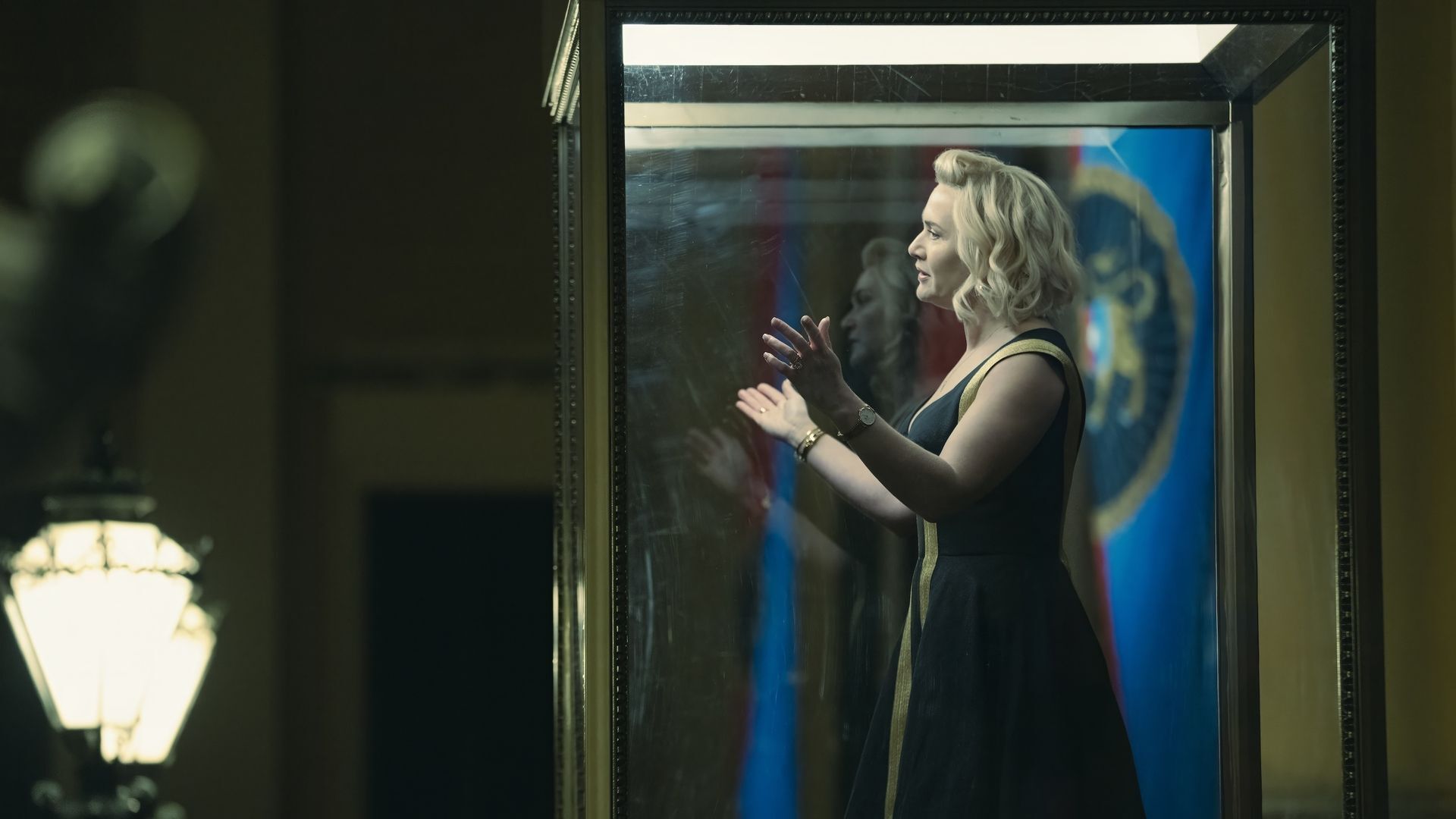
Just as the production revolves around Winslet, the world of The Regime revolves around her character: some out of interest, others out of adulation, a few out of romantic love, and a handful of characters whose existence seems to depend more on the pop culture imaginary of authoritarian regimes than the plot. Chancellor Elena Vernham (Winslet) rules with an iron fist over an unnamed nation in Central Europe, caught in the geopolitical dance between America and China, due to important cobalt deposits. By the time we are thrown into the midst of this contrived autocracy, the iron fist is more like a velvet glove: like most dictators, Elena has become (rather prematurely) hypochondriac and paranoid. Opinions whispered in the palace corridors are divided; no one is sure if it’s just a passing fad ((like when she got it into her head that she was a descendant of Charlemagne) or if it’s time for a power reshuffle or better to abandon ship.
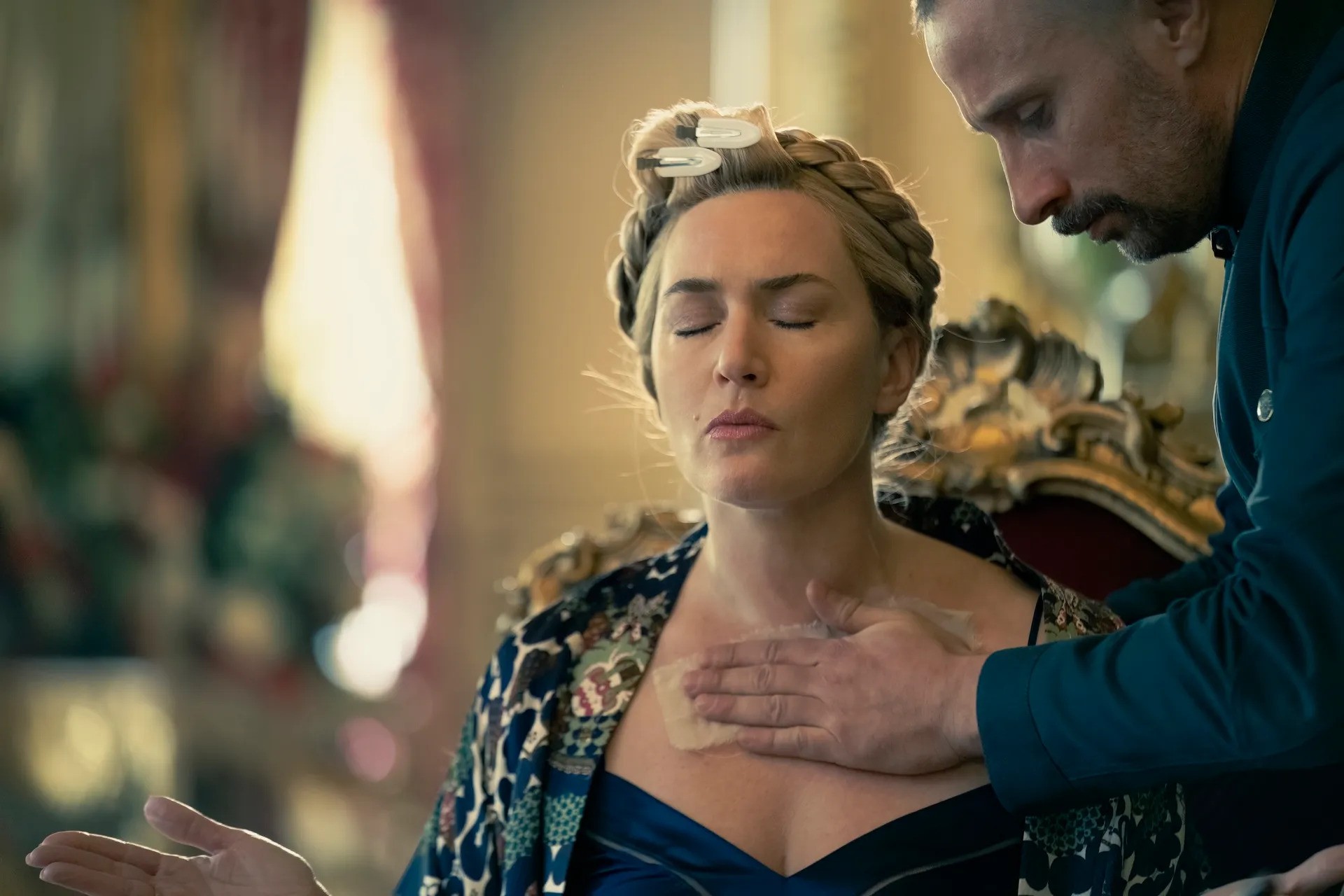
All plans go awry, and all bootlickers (including Elena’s husband) must adapt to an unexpected reality: an alpha male has somehow entered the palace and is leaping up the corridors of power, leaving muddy footprints on the plush carpets. A country boy with violent impulses, Corporal Herbert Zubak enters Elena’s testosterone-purged entourage and turns everything upside down. Armed with a moisture detector, the soldier walks before the chancellor to protect her from germs and mould. His overzealousness quickly makes him fall from grace. Still, he bounces back after saving her from an intruder and becomes her bodyguard, homeopathic medical advisor, personal trainer, political strategist, war hero, political prisoner, lover, and scapegoat.
Herbert is the genuine rural-nationalist impulse that pushes Elena’s posh, clientelistic autocracy to align its actions with the demagogic rhetoric: out with the Americans (for real, not just on TV), back to traditional values (Western medicine is poison, potato vapours are the solution), agrarian reform (up with the beet farmers, down with the oligarchs), union with the brethren from some enclave (referendum with the army in the streets). With the grace of a beast of burden and the temperament of an attack dog, Herbert is superbly played by Matthias Schoenaerts (fully aware that he would win the audition for a Vladimir Putin biopic any day).
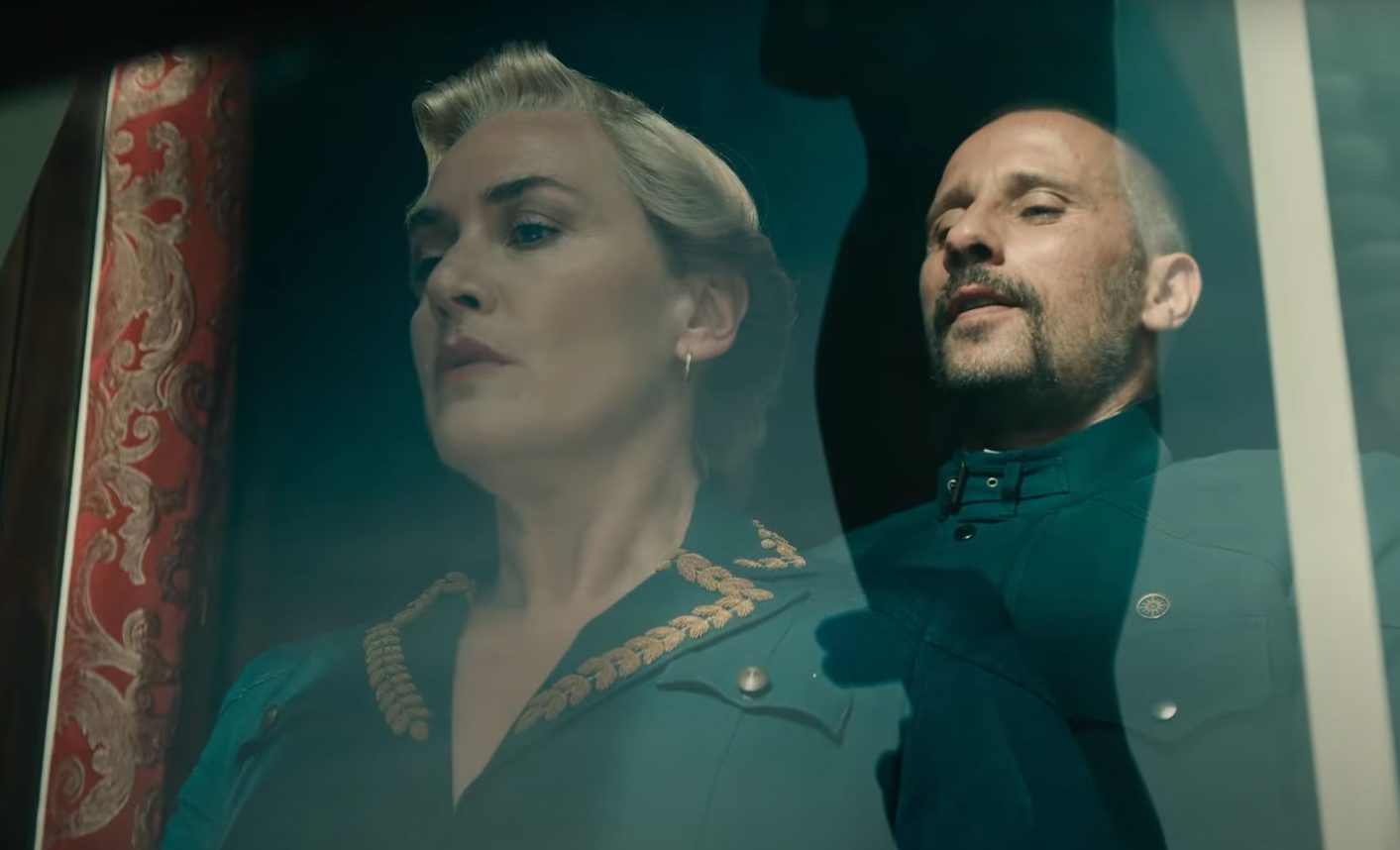
Herbert, like Elena – like the unnamed country in Europe, like the whole film – is, after all, a composite, a sum of real historical details, textbook dictatorship typologies, the sort of thing that if you heard it out of context, you’d be convinced it was about such-and-such country, such-and-such dictator, such-and-such geopolitical event. In fact, The Regime gave me a rare moment of – for lack of a better term and in the broadest sense – cultural appropriation. With her platinum hair and complicated relationship with her father who founded the party and instilled her with traditional and nationalist values, it’s hard not to see the resemblance between Elena Vernham and Marine Le Pen. When the popular revolt reaches the palace, events precipitate in a much more… Romanian way. Lenny, as her husband fondly calls her, becomes Leana: there is a helicopter ready on the palace roof, security betrays her and allies itself with a sort of National Salvation Front (National Freedom Front here), the tyrant is accused of genocide and says she will only answer to parliament … and all this happens on Christmas Day.
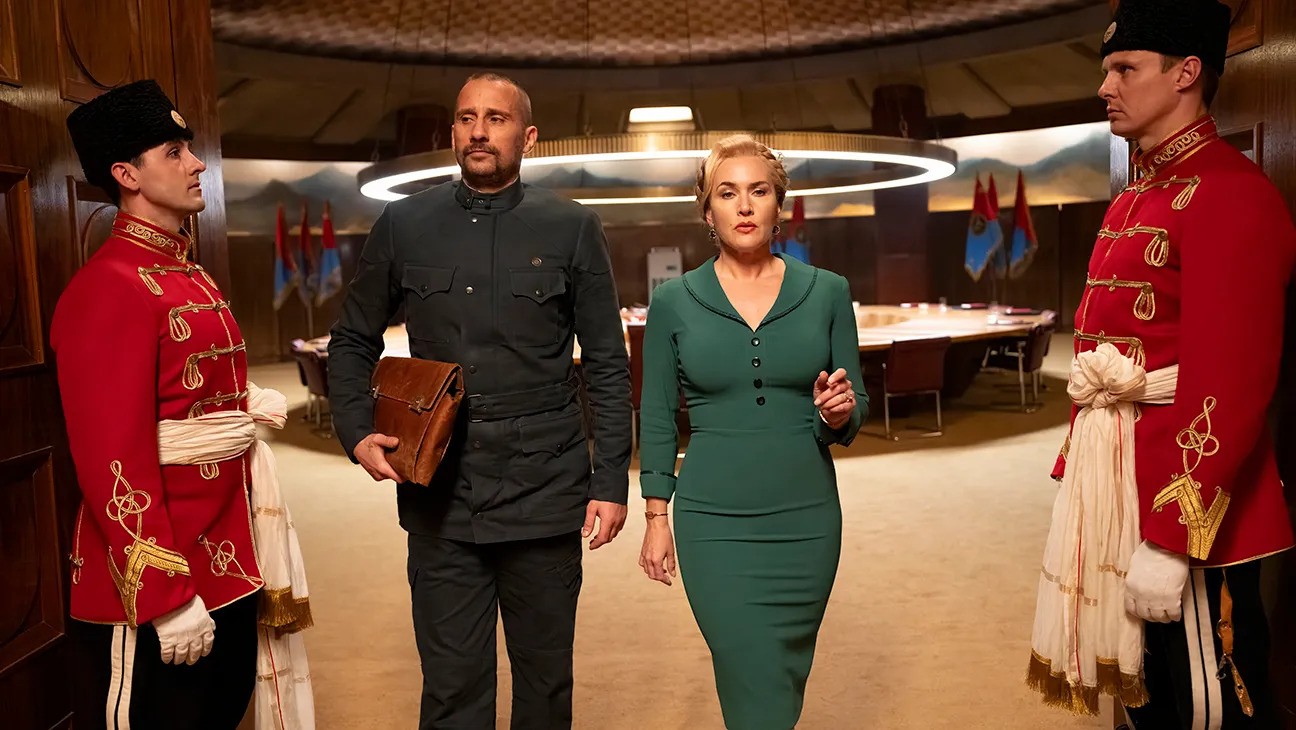
What The Regime does well, when it does, is reshape the dynamics of authoritarian regimes according to present-day sensibilities. It’s where the satire scores well and with humour, or at least with originality, for the dictatorial regime here is a feminine one, motherly even, full of love for its subjects: Elena’s favourite phrase to conclude her speeches is “I bless you all, and I bless our love.” Her soft authoritarianism comes with techniques for manipulating the men on whom she builds her power, but also with daddy issues and the need for validation on social media. There’s a great scene where Elena takes a glamorous selfie at breakfast, eating caviar with her husband and fake child – aiming to show her subjects that everything is fine and American sanctions don’t affect them.
There are variations on the theme of female dictatorship that fail for one reason or another and blow up the satire (for example, the Christmas show where the protagonist sings Santa Baby seductively), increasingly so in the second half of the series. But there’s also the character played by Andrea Riseborough, a sort of personal assistant to the chancellor, who by all appearances has considerable informal power (and the wit to navigate murky waters) but always walks around dressed in a floor-length grey uniform. The Regime is, after all, a soft autocracy, not some North Korea-type experiment. I thought it was just a vanity thing on the part of the creators, to plant in this very much rooted-in-reality satire a character seemingly taken straight out of 1984 or some other totalitarian dystopia. But in the end, a docile, monotonous mouse like Agnes, who doesn’t stand out in any way, is a very clever embodiment of the basic concepts that The Regime juggles with: how else, sartorially speaking, could another woman survive in the proximity of the chancellor who everyone must adore?
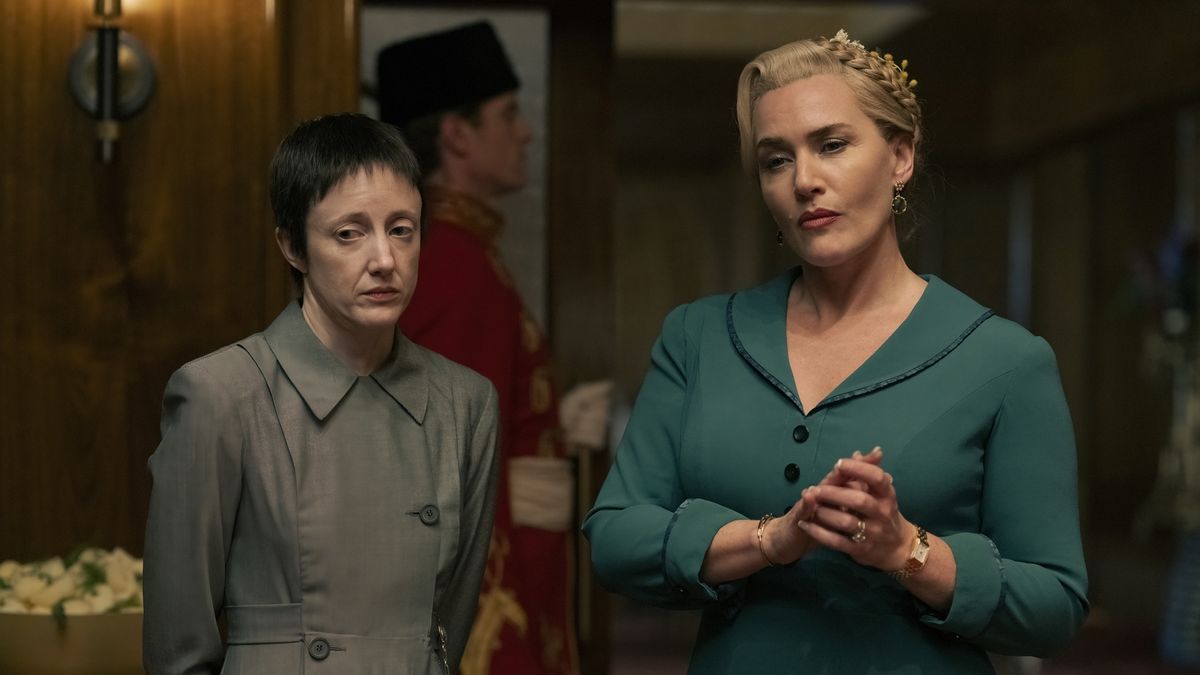
In addition to Reisborough, it’s worth mentioning Martha Plimpton, excellent in the role of the American emissary, and Hugh Grant as the former chancellor, who is kept in prison and occasionally taken out for filming fake news, acting as the regime’s antagonist, always behind whatever plot is concocted.
Without being a flop, The Regime perfectly embodies the definition of average quality that the TV series industry has been working with for a few years now: a top-notch cast and at least decent scripts, so the actors have something to work with. It certainly helps to have trendy topics: a European autocracy, under American sanctions for invading a neighbour, led by a hypochondriac leader (also parodied here is the famous long table at which Putin held his meetings). Inevitably, all these productions disintegrate somewhere along the way, as the initial promising premises run out of steam, the good jokes have already been told, and all the narrative threads must be gathered together into a coherent ball (the advantage of TV shows is that they can always leave things hanging to be resolved in the next season).
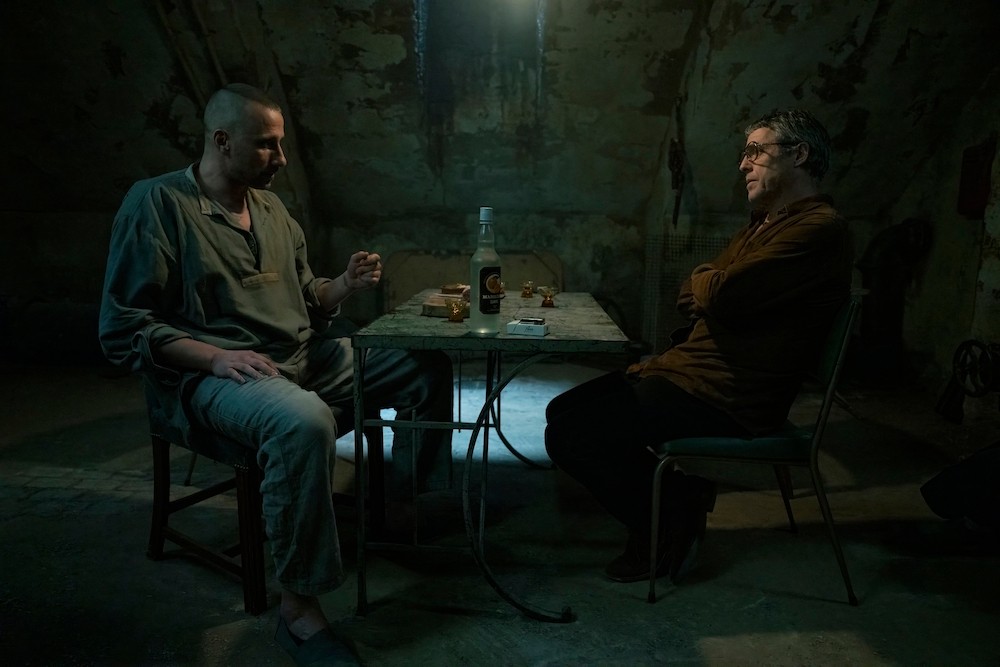
There is, however, a version in which The Regime could truly be a brilliant geopolitical satire. What was it all about? The regime is located in Central Europe, but it’s not necessarily that Central Europe we all know geographically, but rather a political-geographical concept with no clear delineations (except the obvious one that it’s not that settled, western Europe), where some Western screenwriters can hide a fictional country, using plenty of real references. It’s an unnamed country that borrows enough from countries in the region, not just elements of their autocratic past or present. The similarities with the Russian autocracy are obvious, but we are not dealing with an allegory here; Belarus is about the only country where such a scenario would fit, and that’s only to a small extent. Despite giving no name or precise location, The Regime insists on anchoring this fictional country in a very real continental reality: the US is a major player in the region, in direct competition with China, and is ready to offer NATO integration for access to the country’s resources. America and China are vying for spheres of influence in Central(ish) Europe… someone is clearly and deliberately missing from this equation, a global power that The Regime chooses to ignore, a geopolitical vacuum stretching across thousands of kilometres between Central Europe and China, which nobody cares about and whose opinion nobody asks. Viewed from this unlikely angle, The Regime is basically a diss track against Russia spread over 6 episodes.
The Regime is available on HBO Max
Film critic and journalist, UNATC graduate. Andrei Sendrea wrote for LiterNet, Gândul, FILM and Film Menu, and worked as an editor on the "Ca-n Filme" TV Show. In his free time, he works on his collection of movie stills, which he organizes into idiosyncratic categories. At Films in Frame, he writes the Watercooler Wednesdays column - the monthly top of TV shows/series.
